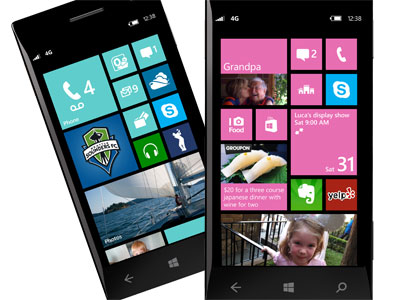Microsoft Considers Allowing Android Apps on WP8
Unnamed sources are reporting that Microsoft is considering allowing Android apps to run on Windows Phone 8 and Windows 8. Sources told The Verge that some inside Microsoft actually like the idea of enabling Android apps inside both stores. After all, if BlackBerry can run Android apps, why can't Windows Phone? Others believe that such a move could kill the Windows platform altogether.
Both sides have a point. By enabling Android installs – and we're talking about Windows Phone, not Windows 8.1 – the Windows platform would get a huge boost in content, probably one of Windows Phone's biggest sore spots to date. The only drawback it seems, and this is an assumption, is that developers would be less likely to create Metro versions.
But by adding Android apps to the Windows menu, it would seem that Microsoft accepts defeat. This is a white towel that Microsoft does not need to throw into the smartphone ring at this point in time; the company has enough woes trying to fix the Windows 8 platform. What Microsoft does not need right now is to make another radical step that may push Window Phone customers to Android or… dare I say it… iOS.
What Microsoft needs right now are Android and iOS developers creating Metro apps for both Windows 8.1 and Windows Phone 8. Then again, if Microsoft enables Android apps on Windows Phone, the company could very well steer many Android loyalists over into Microsoft's corner. That would be interesting. Windows Phone apps and Android apps working side by side.
As Business Insider points out, Microsoft has had a rough time convincing Android and iOS developer to bring their apps to Windows "in a timely fashion." Instagram took three years, and the recently nuked Flappy Bird never made it to the platform. Getting potential customers excited about your hardware is pretty tough when the competing platforms have all the fun stuff.
Microsoft definitely has something to think about if the info from Verge's sources is true. If the company does decide to enable Android apps whether natively or through a third-party enabler, Microsoft would have a huge library on its hands. If customers are buying Windows phones to mainly use Android apps, they may be better off purchasing an Android phone instead.
Here's something The Verge says that I find quite interesting. "Android is the mobile equivalent of Windows on desktop PCs — it's everywhere. That growth shows no signs of stopping, and it represents a huge blockade for Microsoft's mobile efforts across multiple market segments."
Get Tom's Hardware's best news and in-depth reviews, straight to your inbox.
Yes, Microsoft definitely has something to think about.

Kevin Parrish has over a decade of experience as a writer, editor, and product tester. His work focused on computer hardware, networking equipment, smartphones, tablets, gaming consoles, and other internet-connected devices. His work has appeared in Tom's Hardware, Tom's Guide, Maximum PC, Digital Trends, Android Authority, How-To Geek, Lifewire, and others.
-
NightLight that's big. Altough msft lagged behind in the software department, that gap has now been reduced. Hardware sales aren't that bad either. it's certainly not a bad feature to have imho.Reply -
Tomas650 I'd definitely consider a windows phone if they allowed this. Content was the only thing holding them back.Reply -
JD88 I'm not sure why Windows Phone even needs to exist. Microsoft should focus on creating excellent software and services for the platforms that exist. If it wants to sell phones, just use a Skinned version of Android to begin with. It can't possibly think it's going to make any money off Windows Phone licensing fees.Reply -
alxianthelast What is an Android loyalist. Get me out of here! Only using Android because they have apps not hardware.Reply -
Reply
Yes, let us all remain in and focus on the past.12686903 said:I'm not sure why Windows Phone even needs to exist. Microsoft should focus on creating excellent software and services for the platforms that exist. If it wants to sell phones, just use a Skinned version of Android to begin with. It can't possibly think it's going to make any money off Windows Phone licensing fees.
Why innovate? Why create something new?
Just focus on the things that already exist and stop progressing.
Seriously, though:
Guess what, friend. Microsoft was in the smartphone market even before the iPhone was even a rumor.
I owned a Windows Mobile 2004 device. Awful thing that always crashed, but it did exist and was made by Microsoft.
You want Microsoft to focus on the things that already exist? They're doing it already.
Windows, Xbox, Windows Phone.
Do you really expect them to give up on the Xbox One, just because it's currently not doing so well compared to the PS4?
Do you really think they'd ditch Windows, if Apple ever managed to dominate the desktop/notebook market?
Not likely, son. Not likely at all. -
Blazer1985 Lumias had some great selling point for me (european user). If you travel a lot and can't use data services abroad, offline maps and translator are a must. Plus it has a nice interface although user experience REALLY needs to be refined in some cases.Reply -
bmacsys This worked out great for BBM 10 too. LMFAO! Why write native Windows phone apps then? Its a huge admission of failure. 4+ years and Windows phone has went nowhere in the USA or Europe. The one hope they have is if the didn't charge licensing fees like Android. That would possibly jump start things.Reply -
tcb1005 I hope they don't allow the thousands of malware-filled applications from android onto Windows Phone.Reply
